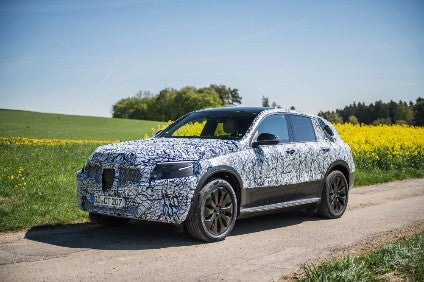
Daimler has updated development progress on its 2019 EQC – the first all-electric Mercedes-Benz EQ brand model – ahead of hot weather durability testing in Spain this summer.
Prototypes completed winter testing in northern Sweden between January and March and now comes suspension/powertrain tests plus integrated complete vehicle high temperature testing in southern Europe.

Discover B2B Marketing That Performs
Combine business intelligence and editorial excellence to reach engaged professionals across 36 leading media platforms.
"Systematic complete vehicle validation serves to guarantee our high quality standards and is one of the extensive measures in the development process of every Mercedes-Benz model series," the automaker said in a statement.
Before going into production, a new vehicle must reach a defined "maturity level".
Daimler's digital testing covers all key areas of vehicle development from simulation and validation of construction feasibility to crash performance, aerodynamics, ride and handling, NVH (noise/vibration/harshness), weight plus consumption and range.
Despite all the advantages of digital testing in terms of speed, data availability and efficiency, no vehicle, of course, goes into series production without extensive real world testing.
The focus is on the durability of components such as drivetrains on the test bench and the functional testing of the entire vehicle under various climatic conditions on the road. The EQC requires special attention to the electric powertrain and battery.
Daimler said acoustics also require special attention in an electric vehicle because, in contrast to combustion engine vehicles, there is little heard from the powertrain and this makes sounds such as tyre rolling and wind noise more prominent.
The company said the ratio of 35% to 65% between digital testing and real world testing combined the best of both worlds.
Around 200 prototypes and preproduction vehicles have been built and tested and several hundred people from many different development departments are involved in testing and validation. These include specialist departments, which approve their components and modules, through to testing/endurance testing of the complete vehicle.
When finally launched, the EQC will have been in development for around four years.
It will have been subjected to three winters and summers and to extreme conditions from minus 35C to over 50C.
Before going on sale worldwide, the EQC will have undergone extensive testing in Germany, Finland, Sweden, Spain, Italy, Dubai, South Africa, the US and China.
To meet the targets for every component and the complete vehicle the EQC soon will undergo a 'stress programme' in Spanish heat. Here the effects of temperature during driving will be tested under extreme conditions along with other particularly challenging aspects for an electric vehicle, such as air conditioning and charging.
Said Daimler: "The EQC must offer the quality and driving experience of every Mercedes-Benz."






